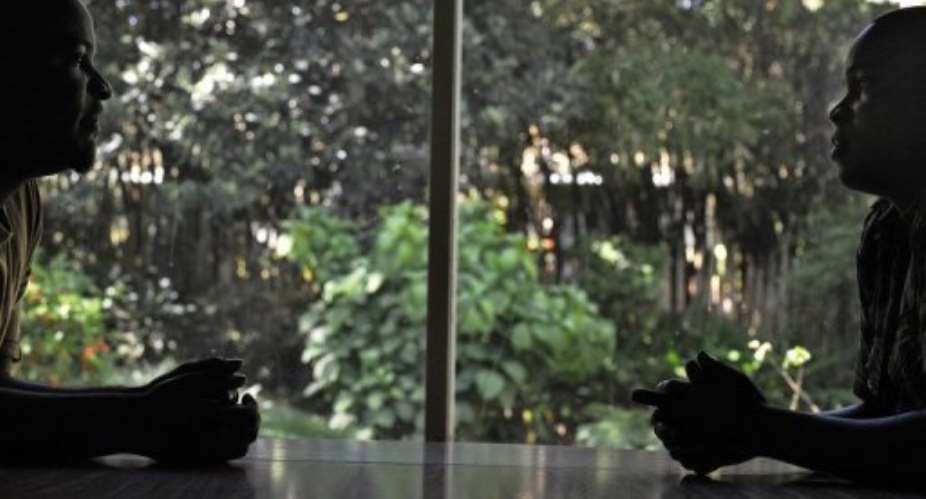KAMPALA (AFP) - Gay rights activists on Wednesday condemned the reintroduction before Uganda's parliament of a bill that calls for the death penalty for certain homosexual acts and sparked an international outcry.
David Bahati, the MP behind the bill, formally reintroduced the legislation Tuesday after lawmakers voted last year to automatically pass it over to the new session after failing to debate it.
Frank Mugisha, the director of Sexual Minorities Uganda (SMUG), voiced disappointment over the revival of the bill.
"We thought it would come back, but with all the condemnation from local and international human rights groups we had hoped that Bahati would reconsider it, or that parliament would move to strike it down immediately," Mugisha told AFP.
"It is just bringing everything bad up again, but we remain committed to fighting it and challenging it in all ways possible," he added.
Originally tabled in 2009, the bill calls for "serial offender(s)" to face the death penalty, and proposes jail sentences for family members and landlords who fail to report homosexuals to the authorities.
Lawmakers applauded Bahati as the bill -- which US President Barack Obama has described as "odious" -- was introduced, clapping their hands, thumping the seats in parliament and chanting "our bill."
Parliament spokeswoman Helen Kawesa said the bill was reintroduced in its original form, with the death penalty clause still included.
"It is the same as before," Kawesa told AFP.
The speaker urged parliament to deal with the bill quickly, but Kawesa could not say when it would be debated as it had to first be discussed by a committee.
"It now has to go to the legal committee... as the parliament is new, so the committee is new and needs to consider it," Kawesa said.
Homosexuality is already illegal in Uganda, but the proposed bill has previously attracted heavy criticism for the draconian penalties it proposed.
It would introduce the death sentence for anyone caught engaging in homosexual acts for the second time, as well as for gay sex where one partner is a minor or has HIV.
It also proposes to criminalise public discussion of homosexuality -- including by rights groups -- with a sentence of up to seven years in prison.
At an African Union summit last month, UN Secretary General Ban Ki-moon, in an unusually outspoken declaration, told African leaders to respect gay rights, a controversial matter in many African states.
Michelle Kagari, Deputy Africa Programme Director at Amnesty International, urged parliament to "reject this bill in its entirety" as it "must not legislate hate."
"If passed, it would represent a grave assault on the human rights of all Ugandans, regardless of their sexual orientation or gender identity," Kagari said in a statement late Tuesday.
The bill now must pass the legal affairs committee for public hearings and discussion before debate in parliament can proceed, a process expected potentially to take at least several months.
While it went through this process in the last parliamentary session, the bill must be reconsidered as it is a new parliament with new members of the legal committee.
"A lynch mob is being whipped up by extremist MPs and evangelical leaders determined to brutally punish and execute people simply for who they choose to love," said Ricken Patel of Avaaz, an online global activist group.
"Global condemnation stopped this vile law twice before, now we need a tidal wave of outrage to kill it for good."
Ugandan gay rights activists have braved hostility as they fight popular criticism. Last year leading gay rights activist David Kato was found bludgeoned to death at his home outside Kampala.
In November, a Ugandan court sentenced Enoch Nsubuga, 22, to 30 years in jail after he admitted beating Kato to death with a hammer. Nsubuga had claimed he was reacting to unwanted sexual advances.





 We’ll no longer tolerate your empty, unwarranted attacks – TUC blasts Prof Adei
We’ll no longer tolerate your empty, unwarranted attacks – TUC blasts Prof Adei
 Bawumia donates GHc200,000 to support Madina fire victims
Bawumia donates GHc200,000 to support Madina fire victims
 IMF to disburse US$360million third tranche to Ghana without creditors MoU
IMF to disburse US$360million third tranche to Ghana without creditors MoU
 Truck owner share insights into train collision incident
Truck owner share insights into train collision incident
 Paramount chief of Bassare Traditional Area passes on
Paramount chief of Bassare Traditional Area passes on
 Two teachers in court over alleged illegal possession of BECE papers
Two teachers in court over alleged illegal possession of BECE papers
 Sunyani: Victim allegedly shot by traditional warriors appeals for justice
Sunyani: Victim allegedly shot by traditional warriors appeals for justice
 Mahama vows to scrap teacher licensure exams, review Free SHS policy
Mahama vows to scrap teacher licensure exams, review Free SHS policy
 Government will replace burnt Madina shops with a new three-story, 120-store fac...
Government will replace burnt Madina shops with a new three-story, 120-store fac...
